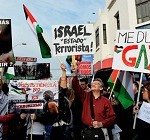Last week, Brazil, Chile, Peru, El Salvador and Ecuador recalled their ambassadors from Tel Aviv, whilst denouncing the disproportionate use of Israeli military force in Gaza in which civilians including women and children have been killed in bombings on military targets as also schools and hospitals. Chile has suspended trade talks with Israel. During the Mercosur summit on 29 July, the presidents of Brazil, Argentina, Uruguay and Venezuela issued a joint statement condemning Israel and calling for lifting the siege in Gaza. Venezuela issued an even stronger statement on behalf of the 9-member ALBA (Bolivarian alternative) group. Bolivian President Evo Morales called Israel as a “terrorist state” and has appealed to the UNHCR (UN Human Rights Commission) to consider “crimes against humanity” and “genocide” by Israel. Civil society has jointed in: Latin American Nobel Prize winners Pérez Esquivel of Argentina and Rigoberta Menchú of Guatemala have called for a military embargo against Israel as done against South Africa during apartheid.
This is not the first time the Latin Americans have reacted to Israeli offensives in Gaza. In 2009, Venezuela and Bolivia had cut off diplomatic relations and Nicaragua followed suit in 2010 after the last Israeli offensives. Cuba had done it in 1973 as part of its ideological support to the Palestine cause.
The vocal criticism and strong language used by Latin America has a reason: the impunity with which Israel has killed over 1,400 (both Palestinians and Israeli) civilians and the support it receives from the U.S., remind many Latin Americans of the atrocities committed by right wing Latin American military dictatorships with similar U.S. backing. Chilean president Michelle Bachelet, a pragmatic and respected Latin American leader, has likened her political exile in Europe during the Pinochet dictatorship, to the plight of Palestinian refugees denied the right to return home.1 This memory has triggered the Latin American governments to react strongly and go beyond the response of many countries around the world.
Latin America is no stranger to Jews and Israel – or to Palestine. Chile has the largest Palestine community of around 400,000, followed by Honduras with 200,000, Mexico has 100,000 and other countries have smaller numbers. But most of these are Christians and they have not stood up in any significant way for the Palestine cause.
But the continent is home to over 500,000 Jews of which 200,000 live in Argentina, 100,000 in Brazil and 50,000 in Mexico. The Jews in Latin America have significant financial clout and control significant business. But the Latin governments have not had the active participation of the local Jewish communities in their foreign policy – unlike the Jewish lobby in Washington which enjoys wide influence in the State Department.
Instead, the Jews in Latin America have assimilated themselves fully in the local societies and do not blindly support Israeli actions. In fact, the Jewish community of Brazil apologized to the Brazilian government over the ‘dwarf statement’ by the Israeli foreign office spokesman. 2 When Israel tried to interfere in the Argentine investigation of the 1994 Buenos Aires Jewish Centre bombing, Argentine foreign minister Hector Timerman (a Jew himself who sought refuge in Israel after his father – the famous journalist Jacobo Timerman, was exiled by the Argentine military in the early 1980s) told the Israeli ambassador on 31 January 2013 that “Israel does not speak for the Jewish people and isn’t their agent. Jews who wanted to live in Israel moved there and became citizens, and those who live in Argentina are Argentine citizens.” 3
In fact, Israel owes a debt to Latin America. Of the 33 votes for the 1949 UN resolution partitioning Palestine into Jewish and Arab states, 13 were from Latin America. These included Brazil, Peru, Ecuador, Bolivia and Venezuela – the very states which have now taken diplomatic action against Israel. Mexico and Colombia, which have reacted mildly to the Gaza offensive now as part of their pro-U.S. policy, had abstained in that crucial voting.
In the years after the creation of Israel, many Latin American countries had taken pro-Israeli positions in global fora because of the U.S. influence with the rightist authoritarian regimes in Latin America – with which Israel was also cozy. But most Latin countries changed their stance after the Israeli occupation of Palestine territories and after the restoration of democracies in their own home countries. Many Latin American countries have since recognized Palestine as an independent state and were sponsors of the UN resolution declaring 2014 as the International Year of Solidarity with the Palestine People.
In the Latin American stance, is a larger political message to the world: that south America is increasingly independent, and will not hesitate to assert its beliefs on the global stage.
Ambassador Viswanathan is Distinguished Fellow, Latin America Studies, Gateway House. He is the former Indian Ambassador to Argentina, Uruguay, Paraguay and Venezuela, and Consul General in Sao Paulo.
This article was exclusively written for Gateway House: Indian Council on Global Relations. You can read more exclusive content here.
For interview requests with the author, or for permission to republish, please contact outreach@gatewayhouse.in.
© Copyright 2014 Gateway House: Indian Council on Global Relations. All rights reserved. Any unauthorized copying or reproduction is strictly prohibited
References
[1] UNHRC Refugees Daily, UN, <http://www.unhcr.org/cgi-bin/texis/vtx/refdaily?pass=463ef21123&id=482d2a6e8>
[2] The Jerusalem Post, ‘Israel slams ‘diplomatic dwarf’ Brazil for recalling envoy to protest Gaza operation’, http://www.jpost.com/Operation-Protective-Edge/Brazil-recalls-ambassador-for-consultations-in-protest-of-IDF-Gaza-operation-368715
[3] The Times of Israel, ‘Israeli ambassador upbraided in Argentina’, http://www.timesofisrael.com/israeli-ambassador-upbraided-in-argentina/


